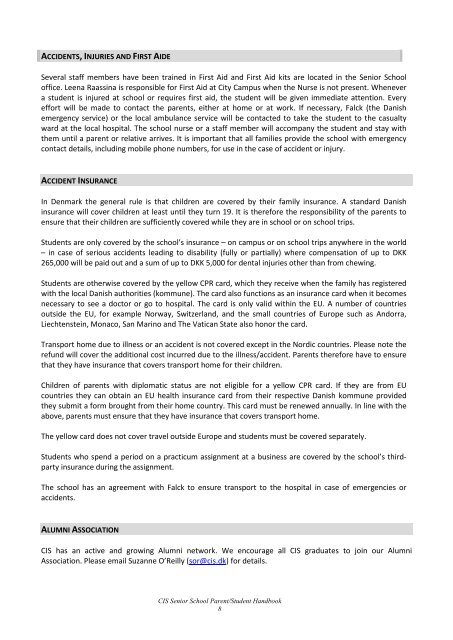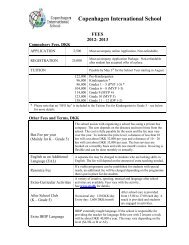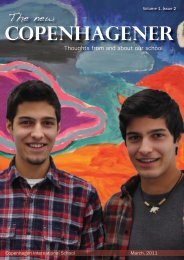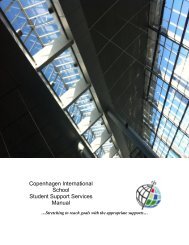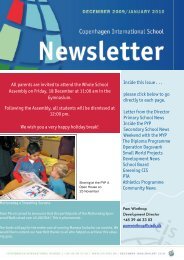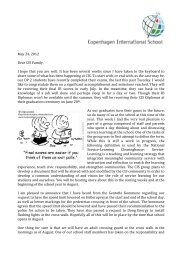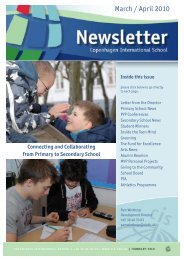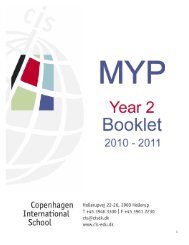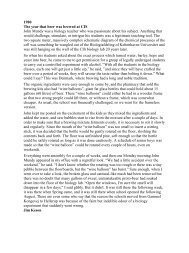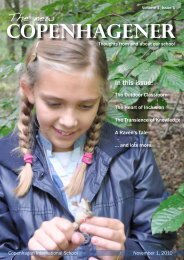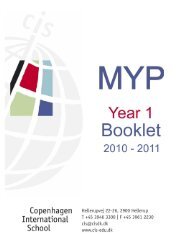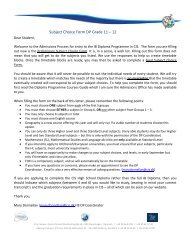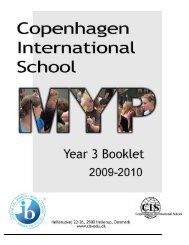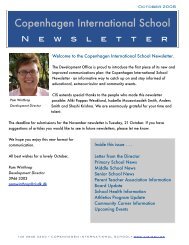here - Copenhagen International School
here - Copenhagen International School
here - Copenhagen International School
Create successful ePaper yourself
Turn your PDF publications into a flip-book with our unique Google optimized e-Paper software.
ACCIDENTS, INJURIES AND FIRST AIDE<br />
Several staff members have been trained in First Aid and First Aid kits are located in the Senior <strong>School</strong><br />
office. Leena Raassina is responsible for First Aid at City Campus when the Nurse is not present. Whenever<br />
a student is injured at school or requires first aid, the student will be given immediate attention. Every<br />
effort will be made to contact the parents, either at home or at work. If necessary, Falck (the Danish<br />
emergency service) or the local ambulance service will be contacted to take the student to the casualty<br />
ward at the local hospital. The school nurse or a staff member will accompany the student and stay with<br />
them until a parent or relative arrives. It is important that all families provide the school with emergency<br />
contact details, including mobile phone numbers, for use in the case of accident or injury.<br />
ACCIDENT INSURANCE<br />
In Denmark the general rule is that children are covered by their family insurance. A standard Danish<br />
insurance will cover children at least until they turn 19. It is t<strong>here</strong>fore the responsibility of the parents to<br />
ensure that their children are sufficiently covered while they are in school or on school trips.<br />
Students are only covered by the school’s insurance – on campus or on school trips anyw<strong>here</strong> in the world<br />
– in case of serious accidents leading to disability (fully or partially) w<strong>here</strong> compensation of up to DKK<br />
265,000 will be paid out and a sum of up to DKK 5,000 for dental injuries other than from chewing.<br />
Students are otherwise covered by the yellow CPR card, which they receive when the family has registered<br />
with the local Danish authorities (kommune). The card also functions as an insurance card when it becomes<br />
necessary to see a doctor or go to hospital. The card is only valid within the EU. A number of countries<br />
outside the EU, for example Norway, Switzerland, and the small countries of Europe such as Andorra,<br />
Liechtenstein, Monaco, San Marino and The Vatican State also honor the card.<br />
Transport home due to illness or an accident is not covered except in the Nordic countries. Please note the<br />
refund will cover the additional cost incurred due to the illness/accident. Parents t<strong>here</strong>fore have to ensure<br />
that they have insurance that covers transport home for their children.<br />
Children of parents with diplomatic status are not eligible for a yellow CPR card. If they are from EU<br />
countries they can obtain an EU health insurance card from their respective Danish kommune provided<br />
they submit a form brought from their home country. This card must be renewed annually. In line with the<br />
above, parents must ensure that they have insurance that covers transport home.<br />
The yellow card does not cover travel outside Europe and students must be covered separately.<br />
Students who spend a period on a practicum assignment at a business are covered by the school’s thirdparty<br />
insurance during the assignment.<br />
The school has an agreement with Falck to ensure transport to the hospital in case of emergencies or<br />
accidents.<br />
ALUMNI ASSOCIATION<br />
CIS has an active and growing Alumni network. We encourage all CIS graduates to join our Alumni<br />
Association. Please email Suzanne O’Reilly (sor@cis.dk) for details.<br />
CIS Senior <strong>School</strong> Parent/Student Handbook<br />
8


